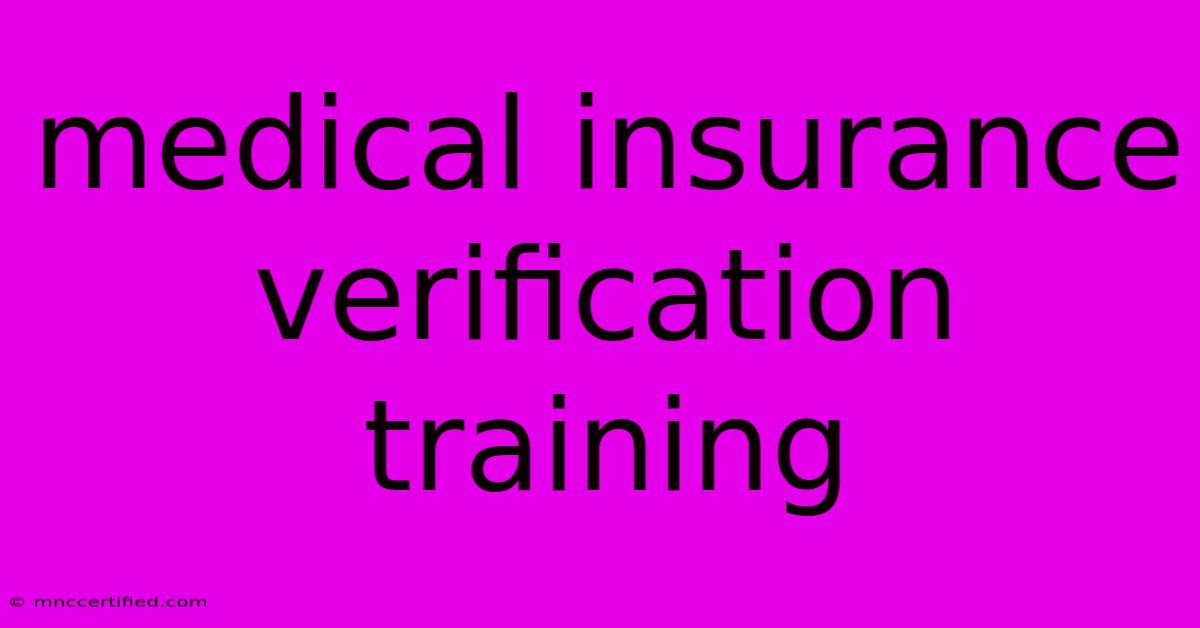Medical Insurance Verification Training

Table of Contents
Master Medical Insurance Verification: A Comprehensive Training Guide
Navigating the intricate world of medical insurance verification can be daunting, but it's a crucial skill for healthcare professionals. This guide provides a comprehensive overview of medical insurance verification training, covering its importance, key aspects, and valuable tips to elevate your expertise.
Why is Medical Insurance Verification Training Essential?
Medical insurance verification plays a vital role in the smooth functioning of healthcare practices. It ensures accurate billing and payment for services, ultimately contributing to the financial stability of the practice. This training equips you with the necessary skills to:
- Streamline the billing process: By verifying patient insurance coverage and eligibility before services are rendered, you minimize the risk of denied claims and costly delays.
- Prevent financial loss: Identifying discrepancies and errors in insurance information early on can save your practice from incurring losses due to incorrect billing or missed payments.
- Improve patient satisfaction: Ensuring accurate billing and quick processing of insurance claims promotes a positive patient experience, leading to higher satisfaction.
- Boost your career prospects: Expertise in medical insurance verification is highly sought after in the healthcare industry, making it a valuable asset for your career growth.
Key Aspects of Medical Insurance Verification Training
Medical insurance verification training programs encompass various essential components:
- Understanding insurance terminology: Learn the language of insurance, including terms like copays, deductibles, co-insurance, pre-authorization, and eligibility.
- Navigating insurance plans: Gain familiarity with different types of insurance plans, including HMOs, PPOs, POS, and Medicare/Medicaid.
- Mastering verification procedures: Become proficient in using online portals, calling insurance companies, and verifying patient eligibility through various methods.
- Handling claim denials: Learn how to identify common reasons for claim denials and effectively resolve denials through proper appeals and documentation.
- Staying up-to-date: Develop an understanding of industry regulations and compliance requirements and stay informed about policy changes and updates.
How to Choose the Right Training Program
Selecting the appropriate medical insurance verification training program is crucial. Consider these factors:
- Accreditation: Look for programs accredited by reputable organizations like the American Health Information Management Association (AHIMA).
- Curriculum: Ensure the program covers relevant topics, including insurance terminology, billing procedures, and claim processing.
- Instructional methods: Choose programs that offer a combination of online learning, hands-on practice, and interactive workshops.
- Instructor credentials: Verify that the instructors have extensive experience and expertise in medical insurance verification.
- Cost and flexibility: Evaluate the program's cost, duration, and scheduling options to find a program that suits your budget and time constraints.
Tips for Success in Medical Insurance Verification Training
To maximize your learning experience, follow these tips:
- Actively participate: Engage in class discussions, ask questions, and seek clarification on any unclear concepts.
- Practice consistently: Utilize the resources provided by the training program to practice verifying insurance information and processing claims.
- Network with peers: Connect with fellow trainees and share experiences, tips, and challenges.
- Stay informed: Subscribe to industry publications and websites to stay updated on policy changes, new regulations, and emerging technologies.
- Seek mentorship: Connect with experienced professionals in the field to gain valuable insights and guidance.
Conclusion
Investing in medical insurance verification training is an investment in your professional development and the success of your healthcare practice. By gaining a comprehensive understanding of insurance procedures, you can streamline operations, improve patient satisfaction, and contribute to the financial well-being of your practice. Remember to choose a reputable training program, actively participate, and continuously seek opportunities for professional growth.

Thank you for visiting our website wich cover about Medical Insurance Verification Training. We hope the information provided has been useful to you. Feel free to contact us if you have any questions or need further assistance. See you next time and dont miss to bookmark.
Featured Posts
-
Statute Of Limitations Insider Trading
Nov 09, 2024
-
Eric Peters One River Asset Management
Nov 09, 2024
-
American Motorcycle Trading Co Reviews
Nov 09, 2024
-
Georgina Cooper 90s Supermodel Dead At 46
Nov 09, 2024
-
Fordneys Medical Insurance And Billing
Nov 09, 2024